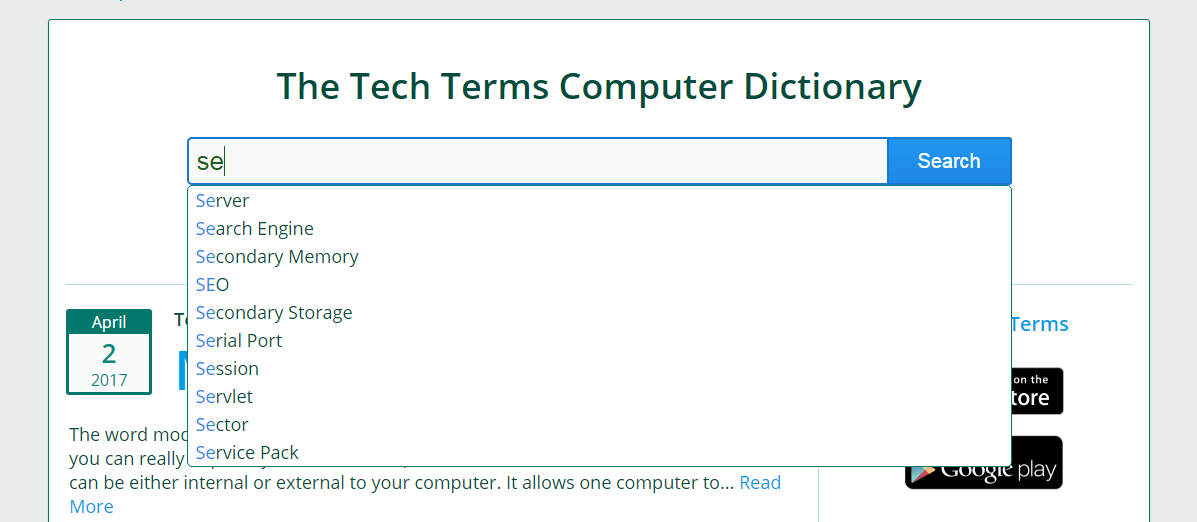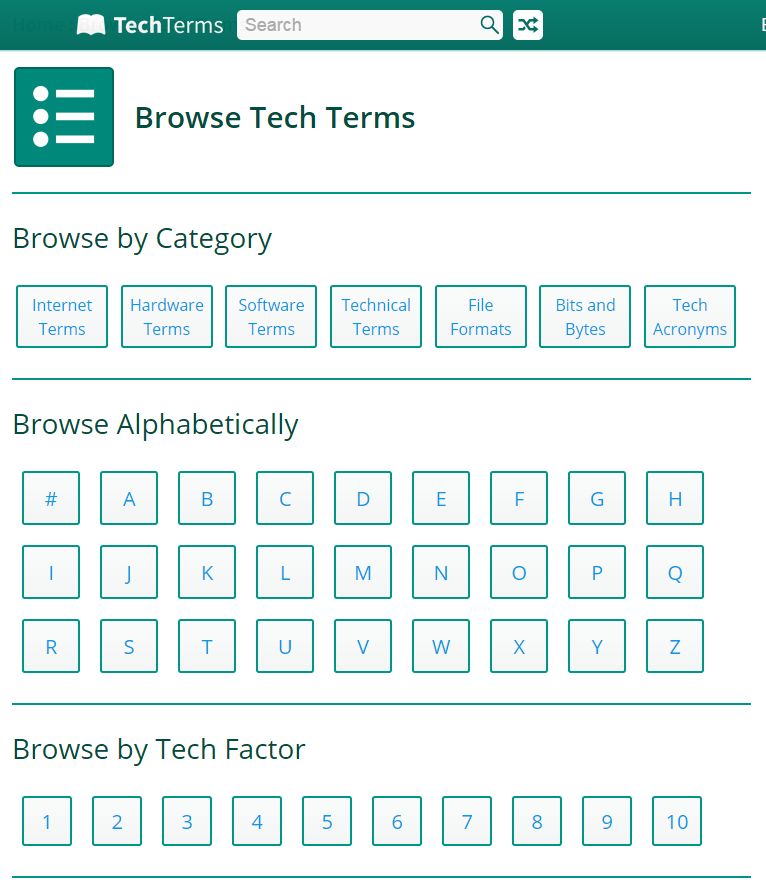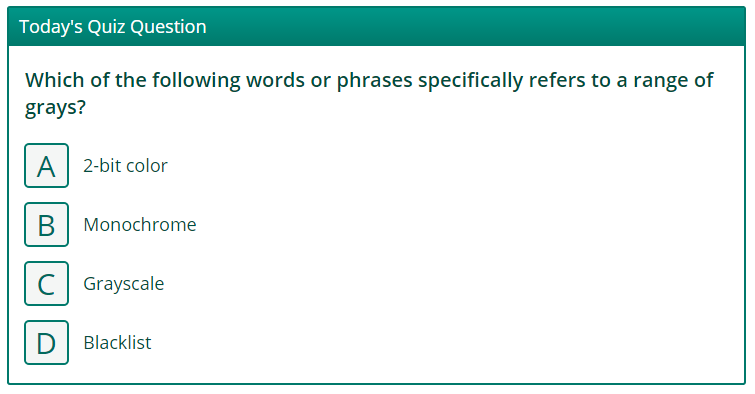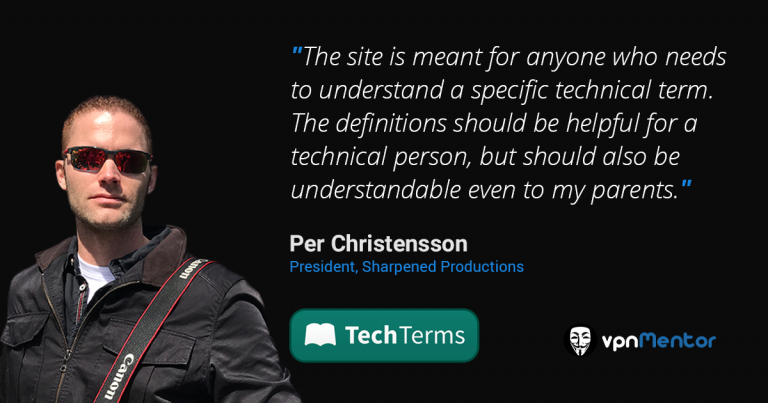TechTerms.com – Teaching the Language of Technology
- Please start with a little bit about yourself and your background.
- In addition to custom web site development, your company Sharpened Productions has developed several different informational web sites, mainly in the area of technology. What is the story behind them?
- I’d like to dig a bit into TechTerms.com, because today, everyone deals with technology in one form or another. Especially in our area of security and privacy, non-technical people are very concerned about these issues, but get blown away by the jargon. So first of all, who is the target audience for TechTerms?
- How many visitors do you normally attract? Where are they mainly coming from?
- How would you describe your current typical visitor?
- How does TechTerms compare to other technology dictionary sites?
- How do you develop your definitions?
- How is the site structured for the user? What options are there?
- What insights have you gained from the analytics of TechTerms? What are the terms or areas of interest that people search for the most? Are you seeing any changes or trends in terms of what people are looking for?
- What are your future plans for the web site? I see you already have TechTerms apps for both iOS and Android.
- Tell a little bit about the other sites you own and operate.
- I saw on your web site that you also several free software tools – I already downloaded and used your file viewer app. Is there a story there?
- How many employees do you have today? Where are they located?
- How many hours a day do you normally work? What do you like to do when you are not working?
No matter how technically savvy one might be, we still come across terms that we don’t know or are not sure we completely understand. Simply doing a Google search for the term can return an overwhelming amount of information, not all of which is 100% accurate. Furthermore, many of the popular definitions that are returned are circular in nature – they define technical terms using other technical terms. That is where TechTerms.com comes to the rescue.
In our discussion with Per Christensson, the founder and brains behind TechTerms.com, we learn about the history and goals of this dictionary of technical terms, what features users love the most, and what terms are currently looked up the most often.
Please start with a little bit about yourself and your background.
My formal education degree is in Computer Science and Communication and I’ve been building web sites for quite a long time. I built my first public web site – a computer glossary – in 1999. Right from the beginning, my computer glossary site got a lot of traffic – there really was not a lot of information on the web back then. Over time, that site evolved into TechTerms.com, which I spun off as an independent site in 2005.
In addition to custom web site development, your company Sharpened Productions has developed several different informational web sites, mainly in the area of technology. What is the story behind them?
We actually don’t do custom development anymore. Sharpened Productions started out as a web development company, but we stopped that about 10 years ago. Today we just focus on developing and managing our own web sites. It was a fun time, but I have to admit that I don’t miss dealing with clients’ last minute updates and change requests.
I’d like to dig a bit into TechTerms.com, because today, everyone deals with technology in one form or another. Especially in our area of security and privacy, non-technical people are very concerned about these issues, but get blown away by the jargon. So first of all, who is the target audience for TechTerms?
Yeah, I get that question a lot. The truth is that I try not to target a specific audience. The site is meant for anyone who needs to understand a specific technical term. The definitions should be helpful for a technical person, but should also be understandable even to my parents.
TechTerms currently has about 1,300 entries and I add terms on a weekly basis. I also update existing terms as required. My goal is not to have the largest dictionary on the web, but to have the highest quality technical dictionary. All of the definitions are written exclusively by me.
How many visitors do you normally attract? Where are they mainly coming from?
TechTerms.com normally gets 20K – 30K unique visitors per day, mainly from English speaking countries. At least 50% of our visitors are from the US, and a high percentage is from European countries.
How would you describe your current typical visitor?
I can really only judge that based on the emails I receive. I usually get about half a dozen emails a day and they are mostly from people who are not technically proficient. I do receive some emails from visitors who are technically skilled – usually corrections or suggestions. I am never offended by such emails, since I am always trying to improve the site and the definitions.
How does TechTerms compare to other technology dictionary sites?
Our focus is on providing high quality and clear definitions to the common user. That is why TechTerms is easier to understand and doesn’t include circular definitions, i.e. defining technical terms using other technical terms.
How do you develop your definitions?
I have a degree in Computer Science and I understand how these things work. I obviously do some research, but my definitions are mostly based on my knowledge and experience.
How is the site structured for the user? What options are there?
Essentially there are two ways to find terms on the site:
- Search
- Browse
An important feature that we added to search box is auto-complete. As you start typing in the search box, we display a list of the available terms matching that text. This makes it easier for the user and also reduces the number of emails we receive due to misspellings.

When browsing TechTerms.com, you have three choices of how to browse:
- Browse by Category
- Browse Alphabetically
- Browse by Tech Factor

The site also offers two additional learning tools, which are featured prominently on the home page:
- Term of the Day
- Quizzes
In addition to the Quiz of the Day, you can also access the archives of past quizzes. These quizzes are very popular - people love to see how smart they are... Every day, 100s of quizzes are taken just from the home page and we have received a lot of requests to add them to the mobile apps. We are also planning to organize the archived quizzes by category.

What insights have you gained from the analytics of TechTerms? What are the terms or areas of interest that people search for the most? Are you seeing any changes or trends in terms of what people are looking for?
We have found an interesting sweet spot, where people want to understand basic terms, but are afraid (or don’t need) to look up harder terms. Most of the terms people look up are hardware terms, presumably because they are in the news and they want to understand what they are reading.
Over time, we have seen more interest in Internet and Social Media terms, as well as popular communications protocols. For example, there has recently been a lot of lookups for “HTTPS” since Google has been making a big deal out of it.
What are your future plans for the web site? I see you already have TechTerms apps for both iOS and Android.
In the relatively short term, we are looking to update our mobile apps and maybe offer a Pro version of them (e.g. with quizzes).
We are also looking into offering more structured and categorized quizzes, as well as the possibility of subscribing to a daily email with a “term of the day.”
Tell a little bit about the other sites you own and operate.
It all started with my original site – pc.net, which is still active. But over the years, we have spun off several other web sites:
- FileInfo.com - File extensions database
- TechTerms.com - Dictionary of computer and Internet terms
- SlangIt.com - Slang dictionary of acronyms, abbreviations, and slang terms
In terms of revenues, 80% - 90% of revenues come from ads (AdSense) on the sites, with some additional income from some affiliate offerings.
The highest percentage of revenues comes from FileInfo.com, which also has the highest volume of traffic. This is because FileInfo solves a very specific (and often urgent) problem for users, by providing detailed information and instructions to open files. We are continually working to make the site easier to use and have started adding a lot of screenshots.
SlangIt.com is more of a fun web site, both for the users and for me. One of my employees works a lot with kids and with youth groups, so he enjoys keeping up to date and developing the slang definitions. It is always interesting to see what terms people are coming up with and what terms are being used.
I saw on your web site that you also several free software tools – I already downloaded and used your file viewer app. Is there a story there?
Actually they are all free except for File Viewer Plus. The story here is that about six (6) years ago I hired a guy with a Master’s degree in Computer Science and instead of just developing web sites we decided to try to develop some software and apps.
Our most popular mobile app is the File Viewer app for Android, which gets over 3,000 downloads per day – exceeding our expectations. We were fortunate in that we got into the app development space early on. Today, it is hard to have a successful app without a lot of marketing.
How many employees do you have today? Where are they located?
We currently have 3 full-time employees and supplement that with some freelancers and contractors, as needed. We are all located here in the Minneapolis-St. Paul area.
How many hours a day do you normally work? What do you like to do when you are not working?
I would like to mention that my workdays extend beyond the typical eight-hour timeframe. The duration of my workdays varies, spanning from 6 to 10 hours per day, and I often dedicate my Saturdays to work as well. However, I prioritize maintaining a healthy balance by incorporating daily exercise and workouts into my routine; it serves as a crucial element for my mental well-being. Furthermore, I derive great joy from participating in sports such as soccer, volleyball, and softball. Additionally, my passion for playing the piano and composing music brings me immense satisfaction.




Please, comment on how to improve this article. Your feedback matters!